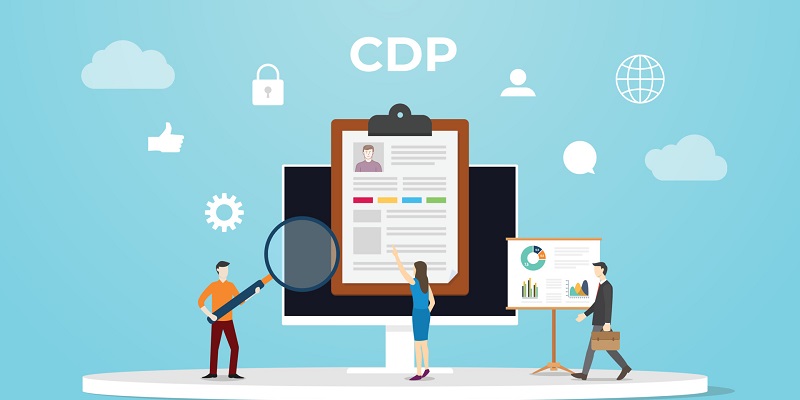In today’s digital age, consumers expect personalized experiences from brands at every touchpoint. From tailored recommendations to personalized promotions and offers, customers want to feel seen and understood by companies. For businesses, this means having access to comprehensive customer data that can be analyzed, understood, and deployed to create effective marketing campaigns. One tool that has emerged as essential for achieving this goal is the customer data platform (CDP). In this article, we will explore what a customer data platform is, why personalization is critical for businesses, and how CDPs can help companies better understand and engage with their customers.
What is a Customer Data Platform (CDP)?
A Customer Data Platform (CDP) is a software that helps businesses collect and organize customer data from various sources such as website, mobile apps, CRM systems, and others. It creates a 360-degree view of a customer by consolidating data in one place and eliminates data silos between different departments of the organization. This platform allows businesses to analyze customer behavior and preferences to deliver more personalized and effective marketing and customer experiences.
A CDP (Customer Data Platform) is a software platform that allows businesses to collect, unify, and activate customer data from various sources in real-time or near-real-time. A CDP provides a single, centralized location for customer data, which can then be used to create a unified customer profile. This profile can include data from different sources such as website visits, email interactions, and purchase history.
The Importance of Personalization for Today’s Consumers
Consumers today expect companies to know them intimately and provide personalized experiences. In fact, a recent survey shows that 80% of customers are more likely to do business with a company that offers a personalized experience. Personalization can mean many different things, from recommendations for products, to promotions and messaging that directly address customers’ preferences and interests. Businesses that fail to provide personalized experiences risk losing customers to competitors who do.
Benefits of a Customer Data Platform (CDP) for Understanding Customers and Making Personalized Offers
A CDP enables businesses to better understand their customers and make personalized offers or recommendations based on their purchase history, behavior, and preferences. By using a CDP to collect data from numerous sources, businesses can create a comprehensive profile of each customer. This profile includes information such as demographics, purchase history, and interactions with the brand. The data can then be analyzed to understand customer needs and preferences, and used to create personalized experiences, offers, and promotions.
Data Transparency and Privacy with a CDP
Data transparency and privacy are essential components of a successful customer experience, and a CDP can help businesses stay compliant with data regulations while delivering relevant and personalized experiences to their customers. A CDP provides a single location for customer data, making it easier to ensure that customers’ data is kept secure and confidential. Additionally, customers can be given more control over their data, including the ability to opt-out of certain types of marketing messages or requests to delete their data entirely.
Tracking the marketing impact with a CDP
CDPs can also help businesses track the impact of their marketing efforts and make data-driven decisions to improve their strategies. By monitoring customer data, businesses can see which campaigns are most effective, which segments are responding best, and where adjustments need to be made for future campaigns. This data can be used to identify new opportunities for growth and keep campaigns relevant to customers.
Creating a Single Customer View with a CDP
A CDP can help businesses to create a single customer view across all channels and touchpoints, allowing for better orchestration of marketing campaigns and more effective customer engagement. By bringing together data from various sources into one platform, a CDP enables businesses to see the bigger picture of each customer’s interactions. This can be valuable for understanding how customers move through the buyer journey and how channels work together to influence each other.
Machine learning and artificial intelligence with a CDP
CDPs can help businesses leverage machine learning and artificial intelligence to make predictions about customer behavior and preferences, and automate personalized marketing campaigns. By analyzing customer data and identifying patterns, a CDP can predict which products a customer is most likely to purchase next or which promotions will be most effective in getting them to make a purchase. Automated campaigns can then be deployed based on these predictions, saving time and resources while delivering more relevant messaging to customers.
Improving Customer Retention and Loyalty with a CDP
CDPs can also be used to improve customer retention and loyalty by identifying and targeting customers who are at risk of churning and delivering personalized offers or content to keep them engaged. By analyzing customer data, businesses can see when customers are becoming less engaged and take action before they decide to leave. A CDP can also be used to identify high-value customers and make sure they receive the attention and promotions they deserve.
Industries that can benefit from a CDP
CDPs can be valuable tools for businesses in industries such as retail, e-commerce, financial services, and hospitality, where customer data is plentiful, and personalization is a key factor in driving revenue and loyalty. Companies in these industries can use a CDP to differentiate themselves from competitors by providing more personalized experiences that keep customers coming back.
As customers demand more personalized experiences, businesses that fail to provide them will be left behind. A CDP provides businesses with a powerful tool for collecting, analyzing, and deploying customer data to create personalized experiences that drive engagement, loyalty, and revenue. From centralized data collection and data transparency to machine learning and personalized campaigns, CDPs offer numerous benefits that can give businesses a competitive advantage in today’s crowded marketplace. By adopting a CDP and focusing on personalization and customer data, businesses can create better experiences for their customers and reap the benefits that come with customer loyalty and retention.

